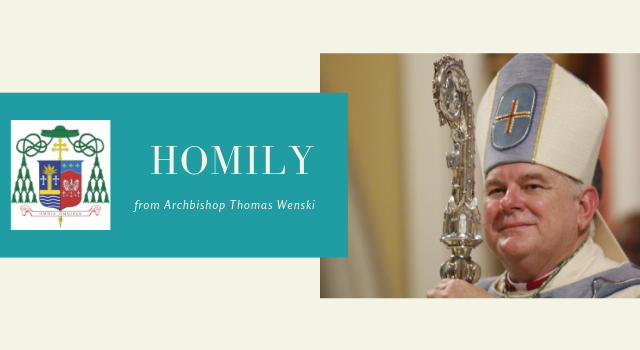By Archbishop Thomas Wenski - The Archdiocese of Miami
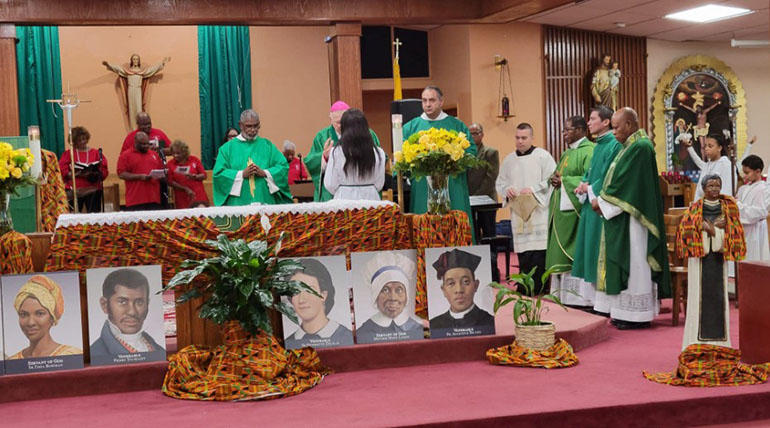
Photographer: Via Facebook @St. Stephen Catholic Church - Miramar
Archbishop Thomas Wenski celebrates Mass at St. Stephen Church in Miramar to mark the start of Black Catholic History Month, Nov. 5, 2022. In front are images of Black Catholics from the U.S. currently being proposed for sainthood.
Archbishop Thomas Wenski preached this homily while celebrating Mass at St. Stephen Church, Miramar, to mark the opening of Black Catholic History Month. The Mass was celebrated on the vigil of the 32nd Sunday in Ordinary Time, Nov. 5, 2022.
I am happy to be here, once again, at St. Stephen’s for the Office of Black Catholic’s celebration of Black Catholic History Month. This is the first time I am here since Father Franky Jean arrived here as your new pastor. Let’s give it up for Father Franky. Also, I would like to acknowledge the director of the Office of Black Catholics, Katrenia Reeves-Jackman and Dr. Donald Edwards, associate superintendent of Schools in the archdiocese.
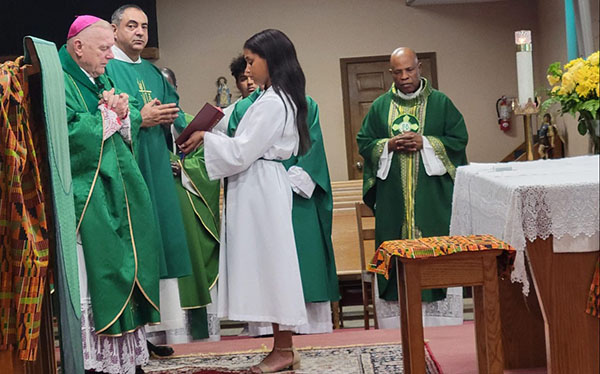
Photographer: Via Facebook @St. Stephen Catholic Church - Miramar
Archbishop Thomas Wenski celebrates Mass at St. Stephen Church in Miramar to mark the start of Black Catholic History Month, Nov. 5, 2022. With him, at left, are Deacon Emilio Infante, and, far right, Father Franky Jean, St. Stephen's pastor.
A few days ago, we celebrated the feast day of St. Martin de Porres and later this month we will observe the birthday of St. Augustine of Hippo – the great North African saint of the 4th century. These observances were one reason why the National Black Catholic Clergy Caucus way back in 1990 designated November as Black Catholic History Month.
It is important for us to know our history – for it is the key to understanding our present and our future. That’s one reason we study the Bible, to understand Salvation History. As St. Augustine of Hippo said, the “New Testament lies hidden in the Old and the Old Testament is unveiled in the New.”
But today, many people, thanks to “cancel culture,” look back on history with a bit of a jaundiced eye. And some have judged the past by the criteria of the present and in doing so discount or distort the achievements of their forebearers because they simply misunderstand the context in which they lived.
For most of our American history, our country has been mostly Protestant. In 1776, when independence was declared, there were relatively few Catholics in America – and in the African American community, there were even fewer. And so, when histories are written about those times, Catholics who were there, and who made no small contributions, can be forgotten and not mentioned.
Some do remember that one Catholic, Daniel Carroll, was a signer of the Declaration of Independence, and that his brother, John, would later become the first bishop of Baltimore, the first Catholic diocese in the U.S.
But very few today remember the Healy brothers. These men of color were born slaves in Macon, Georgia. (Their father was Irish.) One, James Augustine, became the bishop of Portland, Maine; another, Sherwood, became rector of the cathedral of Boston; and Patrick – the first man of color to earn a PhD in America – went on to be the president of Georgetown University. This was before the Civil War.
Thankfully, more familiar to us today, are those who are today on the road to sainthood, Venerable Pierre Toussaint, Servant of God Mother Elizabeth Lange as well as Henriette Delille, Julia Greely, Father Augustus Tolton, and Sister Thea Bowman. All their stories are inspiring: Theirs are stories of faith and perseverance; they experienced the sting of racism both in and outside the Church. But they loved both their country – and their Church, warts, and all.
But some revisionists, looking back through the lens of today’s popular ideologies, would look on history in purely negative ways. For example, Pierre Toussaint, after he purchased his freedom, later took in and cared for the widow of his former owner who had fallen on hard times. For these people, Pierre Toussaint was not showing heroic love and giving an example of forgiveness. No, for them, he was just an Uncle Tom.
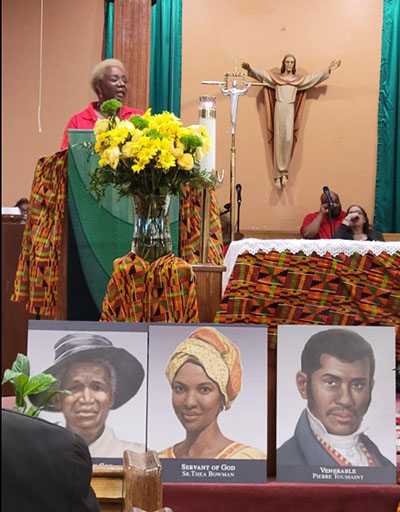
Photographer: Via Facebook @St. Stephen Catholic Church - Miramar
Katrenia Reeves-Jackman, director of the Office of Black Catholic Ministry, speaks during the Mass marking Black Catholic History Month, which Archbishop Thomas Wenski celebrated at St. Stephen Church in Miramar, Nov. 5, 2022. In front are some images of Black Catholics from the U.S. currently being proposed for sainthood.
In the same way, the Church is criticized, and condemned, because as these people allege without supporting evidence, the Church preached resignation and acceptance of the status quo. “Pray and work, live on hay, you’ll get pie in the sky when you die.”
Well, Jesus takes on people like these in today’s Gospel when he takes on the Sadducees. The Sadducees didn’t believe in an afterlife. When you die, it’s over. Which meant since there was no worry about an afterlife or about judgment, you made your peace with the powers that be and tried to enjoy life the best you could. The Sadducees attempt to make Jesus look like a fool by asking him a silly question.
Jesus appeals to the Scripture: Moses called God the God of Abraham, of Isaac and of Jacob. If the Lord is God of the living, then he will continue to be so to those who have died. Relationship with God does not end in death; to God all people are alive.
There are a lot of silly questions that those who think like the Sadducees ask to make the Church appear to be silly, stupid, out of date or irrelevant. But it is important to ask the right question.
There are a lot of questions that divert our attention and take us away from the most fundamental and therefore the most important question of all. And that question is: Why do you exist? Why were you brought into being? What is the meaning of your life? We have an answer; they do not.
God made us to know, love and serve him in this life, and to be happy with him in the next. God did not make us just for us to die one day. He made us for himself.
Belief in heaven, in afterlife, does not distract us from earthly concerns. After all, if this life is our highway to heaven, then as people who believe in a heaven (and a hell) we got to be busy making sure the highway is in good repair. We got to fill those potholes, repair those guardrails, so that we – and our brothers and sisters – don’t break down along the road and not reach our destination.
The heavenly minded end up doing the most earthly good. We see these corporal and spiritual works of mercy carried out by Christians in the name of Christ and especially in the lives of people like Pierre Toussaint, Elizabeth Lange, Augustin Tolton, Henriette DeLille, Julia Greely, and Thea Bowman.
Our first reading makes the point: Because there is a resurrection, some things are worth living for and even dying for.
In remembering the history of Black Americans in the Catholic Church, we recognize that there have been lights and shadows. But, as St. John said in the prologue of his Gospel, “the light shines in the darkness and the darkness has not overcome it.”
In honoring Black Catholic History Month, we wish to emphasize that the Gospel, destined for all men, of all nations and races, has found – and will continue to find – fertile soil among the sons and daughters of the African continent.
In remembering these figures from our Catholic past, we want “to hold ourselves accountable to our baptismal commitment.”
For our God, being a God of the living and not of the dead, has everything to offer you and me.
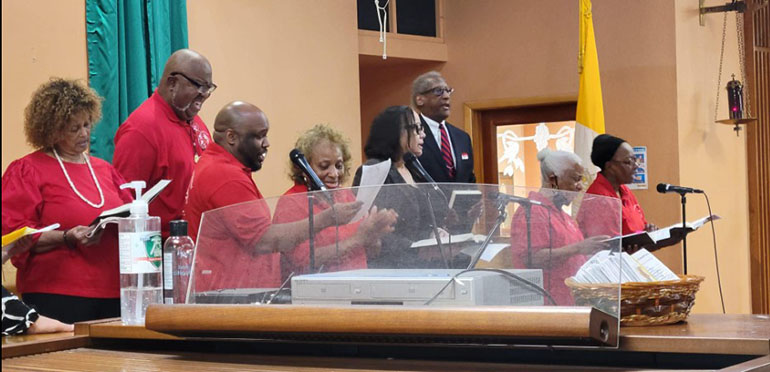
Photographer: Via Facebook @St. Stephen Catholic Church - Miramar
Members of the Black Catholic choir sing during the Mass for Black Catholic History Month, celebrated by Archbishop Thomas Wenski at St. Stephen Church in Miramar, Nov. 5, 2022.
